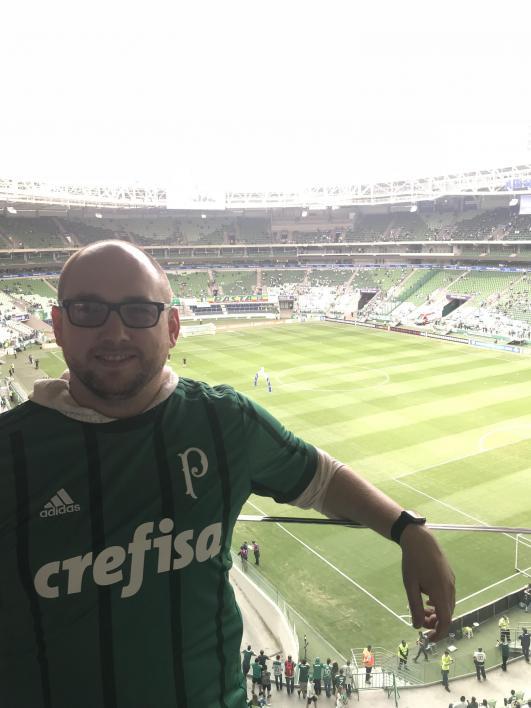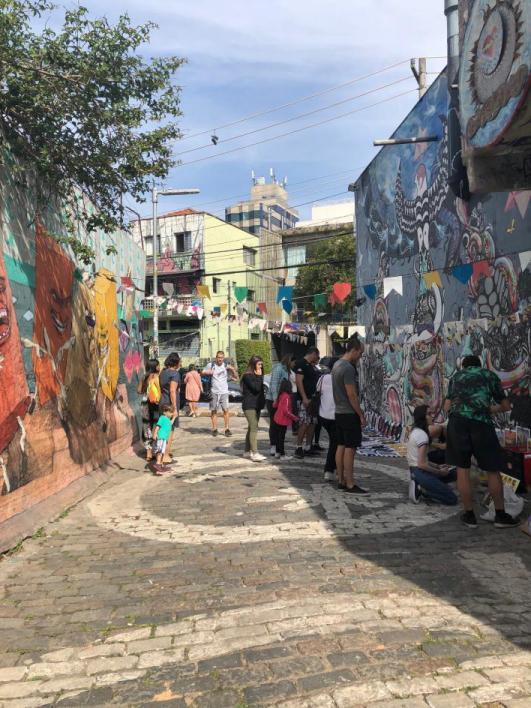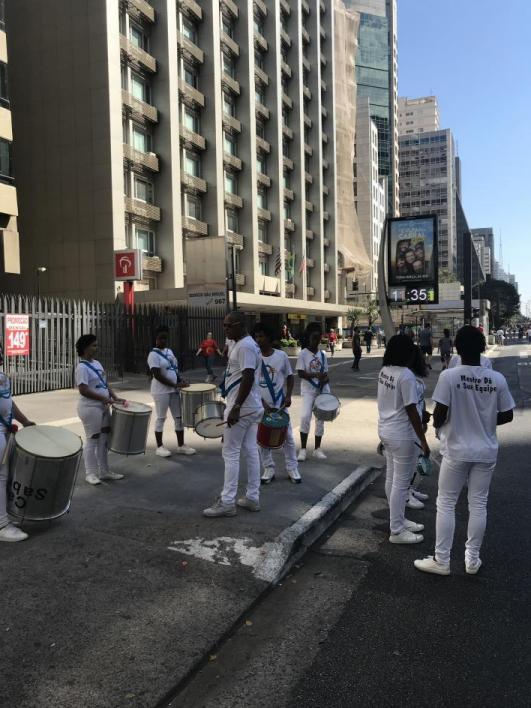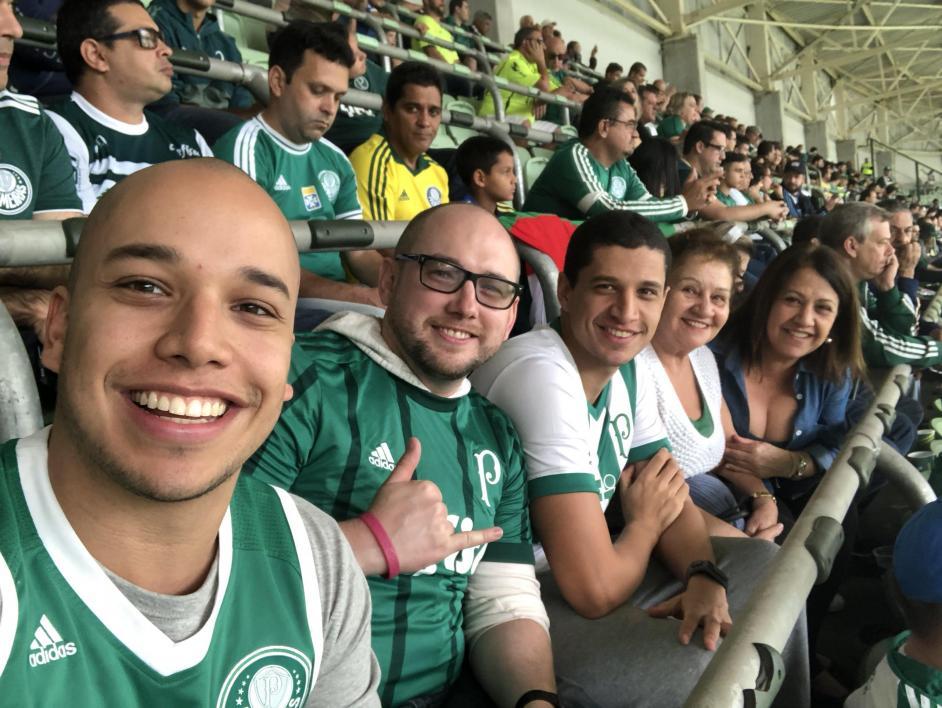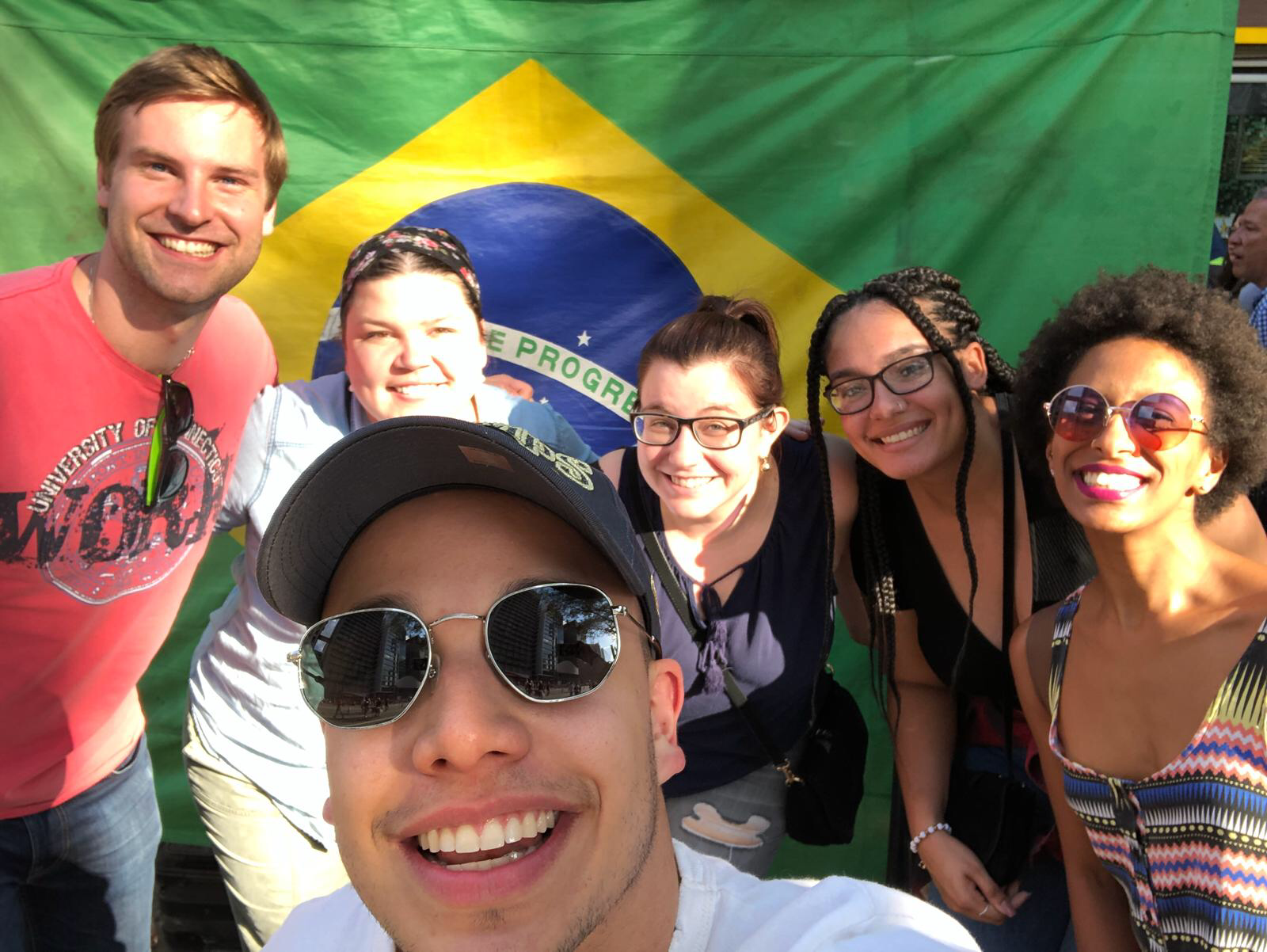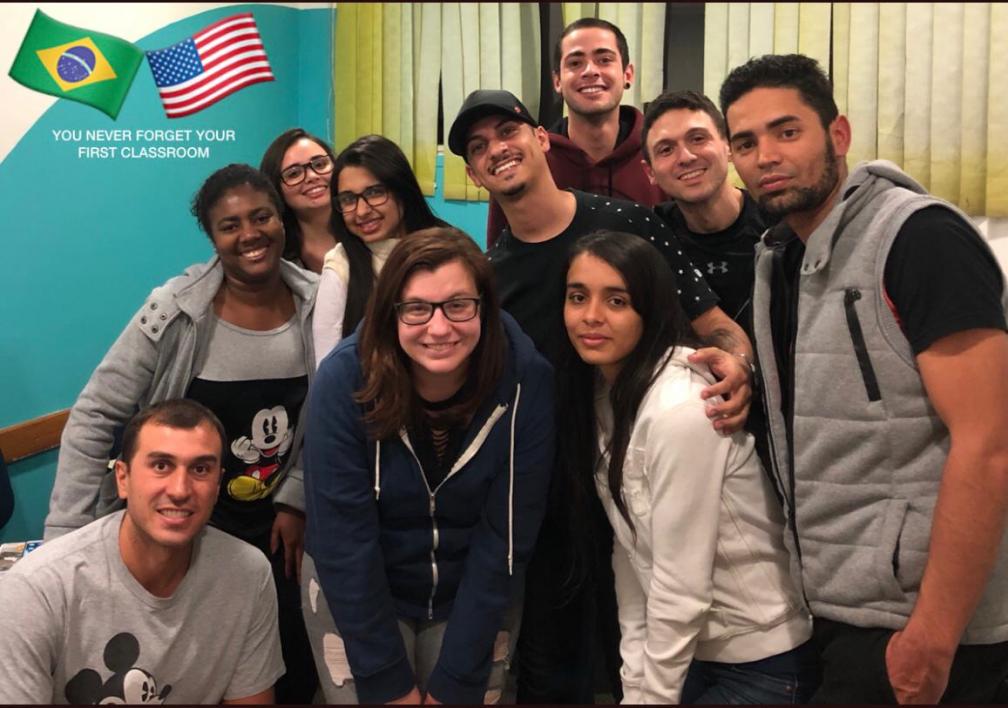This summer, four Arizona State University students participated in a five-week teaching assignment in São Paulo, Brazil.
The first of its kind for ASU in Brazil, this program fulfilled a number of study-abroad program offering needs: to provide an opportunity for students to gain classroom teaching experience and to expand study-abroad program offerings in South America.
"Until this program, we didn't have many options for students to study abroad in Brazil. This program provides a great opportunity for campus-based and ASU Online students alike to gain real-world experience in a cosmopolitan city like São Paulo," said Barbara Young, international coordinator, senior in the ASU Study Abroad Office. "South America is a lot closer and is far more affordable of a price tag for the cost of living to better suit the needs of our students."
This program was facilitated in partnership with the ASU Study Abroad Office and local organizations, social benefit nonprofit 4YOU2 and Campus Brasil. 4YOU2's unique internship curriculum divided their experience up into six themes: Your Development Journey, Cultural Engagement, English Language Instruction, Leadership, Administrative Activities and Social Partnership, accounting for 150 total internship contact hours.
"The internship placements tend to be in low-income areas for Brazilian citizens who don't have an opportunity otherwise to build proficiency in English, particularly those who work in the hospitality and tourism industries," Young said.
4YOU2 placed students in English language schools across São Paulo, and Campus Brasil provided in-country support, including housing assistance, visa coordination, cultural excursion, in-country orientation and local transportation.
ASU Now talked with two students who finished up their program on Aug. 5, to learn more about their experiences: Jordan Husk, an ASU Online senior and English major through the College of Liberal Arts and Sciences' English department and Tim Ashe Jr., Spanish PhD candidate through the School of International Letters and Cultures in the College of Liberal Arts and Sciences
Question: What drew you to the Teach English in Brazil program?
Husk: This internship allowed me to do something I loved and help me figure out what direction I wanted my career to go in. I was looking into getting a master’s degree and education for teaching, but I was unsure if I would like it enough to make it my profession. I like to travel, and this internship gave me the opportunity to travel and find out if I like to teach enough to make it a career. This opportunity has opened my eyes to several different teaching possibilities, including teaching English as a second language, and this program gave me the experience I wanted without the risk.
Ashe: I was drawn to the Teach English in Brazil program through the Spanish and Portuguese department at ASU. As a Spanish instructor and Portuguese student at ASU, I was interested in learning more about the language and culture for research purposes and because I am a linguist. Similarly, I also teach English for my professional career — besides Spanish — and think that being able to have international experiences as an ESLEnglish as a Second Language teacher and researcher is extremely important. The advisers in both the English and SILC departments have been promoting the new program through our internal email and through university webinars.
Q: Did you face any challenges in preparing to study abroad? If so, what were they? How did you overcome them?
Husk: I did not face any challenges so to speak while getting ready to prepare. I had enough time to get my things together and make sure I had the tools and resources I needed, so I felt prepared.
Ashe: Yes, I faced some monetary issues in preparing to study abroad. Studying abroad as a graduate student is not cheap. I overcame them by working multiple jobs during the school year and summer and trying to save as much money as possible before arriving to Brazil.
Q: What preparation or support did you receive to teach courses through this program?
Husk: We can ask questions to the Campus Brasil or 4YOU2 team at any time, and 4YOU2 has a hub manager on site when we teach classes if we have any issues.
Ashe: I have my master’s degree in both English education and in bicultural learning, so I was trained to teach in courses and programs like this one. My current PhD program also offers and requires pedagogical training, too, as part of the coursework and teacher development. Additionally, as a teaching associate at ASU, they assist the instructors with training. The internship through the language academy — 4YOU2 — has provided us with assistance to learn their curriculum and teach Brazilian students as well.
Q: Describe a day in the life on your internship. What is your teaching assignment like? Whom are you teaching? What kind of experiences are you cultivating for your students? What do you enjoy the most/least?
Husk: We had some time at the beginning of the internship to explore the city and get a sense of the culture. Day to day, we usually get breakfast or lunch together if we sleep in, and travel to the school, teach two classes and head back home. We occasionally go out together and night, and we do go out and spend time with each other on the weekends. The teaching assignment is two classes every day, generally with adults — on average they are around 25–35.
For my students, many of them have told me this is the first time they have spent time and talked to a foreigner, so the language and cultural aspects I am showing them, even through simple conversation, is something new and exciting for them. I love how kind and excited my students are, and perhaps the least enjoyable thing is the long commute time to the school.
Ashe: My typical day is teaching from 1 p.m. to 9 p.m. I teach mostly adults from the ages of 18–35. Most of my students are professionals who worked during the day and then took English classes during the late afternoon/evening. Some of my students are high school students and college undergrads on break, too.
I enjoyed using technology and current events to teach my students using different types of interactive tools. I taught all levels of English to them — beginner, intermediate and advanced — in three different classes. I enjoyed learning about a new culture and gaining their perspectives on life. Teaching can be exhausting, but they always brought a positive attitude and an open mind to our activities.
Q: Why are your students enrolling in this program? What do they hope to gain from this experience?
Husk: My students all want to learn English for better opportunities. While those range from getting more money at work because they can speak English, or traveling the world, they all want to personally improve.
Ashe: My students enrolled in English classes to improve their salaries in Brazil and to learn about a different culture. Only 5 percent of Brazilians know English, yet many of their employers reward them for being able to speak it and add it to their CVs. They understand that they will have more opportunities in life if they learn English since it is an important global language.
Q: What are your academic, professional and personal goals? How is this intern abroad program helping you achieve those goals?
Husk: My biggest focus is on my short-term goal of graduating in the fall and opening myself to new experiences. This internship has let me teach in a new country and opened me up to so many amazing people and a great culture.
Ashe: This intern abroad program allowed me to learn more about the Portuguese language and Brazilian Portuguese variety. I also developed a cultural understanding and learned about the education system in Brazil. I was able to teach English classes in a new country and gain valuable experience with different types of students. Lastly, I was able to assist in curriculum development and testing while also doing my own study on technology use in the classroom and its effects on intercultural competence in a language immersion setting for second language acquisition.
The experience will help me with my dissertation (as I piloted the methods portion) and will show that I can teach languages in a variety of settings. Working and learning from South Americans and from teachers with a wide breadth of experience has been an incredible experience.
Q: What has been a highlight and a challenge of interning abroad in São Paulo?
Husk: The best part about São Paulo is the people. Everyone is so warm and welcoming, and they genuinely want to learn about our culture and they want us to experience theirs. I would say the only challenge for me personally was a language barrier, but if you know the basics you can make your way around OK. People are very understanding, and many people love to practice what English they know with you!
Ashe: The highlight is getting to explore a world-class city. Additionally, getting to travel to South America for the first time to interact with amazing, ambitious students has been a pleasure. Of course, when you learn a new language (Portuguese), there are always difficulties and cultural nuances to learn about and adapt to. Also, it can be difficult at times to speak a lot in the target language (English) while in the classroom to fully immerse the students (where sometimes they may have different levels of English) and get them participating at a high level to achieve the goals of the class.
Q: What would you say to ASU students considering a study-abroad program?
Husk: I would encourage anyone to travel abroad if they can. I urge them to try to immerse themselves as much as they could in the culture; food, nightlife, TV shows, local events, sporting events, anything experience that would be different than what they are used to. I would urge them to stay open-minded and flexible but to have fun and not allow the occasional homesickness to get in their way.
Ashe: Take the plunge. Living in another country is incredibly exciting and rewarding. Studying abroad and traveling is good for the soul, and you learn so much about your own country and “culture” by doing it. Brazilians are incredible people who have opened their houses and hearts to me, and I will be forever grateful to them.
To learn more about the 250-plus study-abroad programs in more than 65 different countries offered at ASU, see the Study Abroad Office website. Visit the Study Abroad Expo from 11 a.m. to 2 p.m. Aug. 22, in the Ventana Ballroom of the Memorial Union to learn more about programs and scholarships.
Top photo: City skyline in São Paulo, Brazil. Photo courtesy of ckturistando/Unsplash
More Arts, humanities and education

Local traffic boxes get a colorful makeover
A team of Arizona State University students recently helped transform bland, beige traffic boxes in Chandler into colorful works of public art. “It’s amazing,” said ASU student Sarai…

2 ASU professors, alumnus named 2025 Guggenheim Fellows
Two Arizona State University professors and a university alumnus have been named 2025 Guggenheim Fellows.Regents Professor Sir Jonathan Bate, English Professor of Practice Larissa Fasthorse and…

No argument: ASU-led project improves high school students' writing skills
Students in the freshman English class at Phoenix Trevor G. Browne High School often pop the question to teacher Rocio Rivas.No, not that one.This one:“How is this going to help me?”When Rivas…



